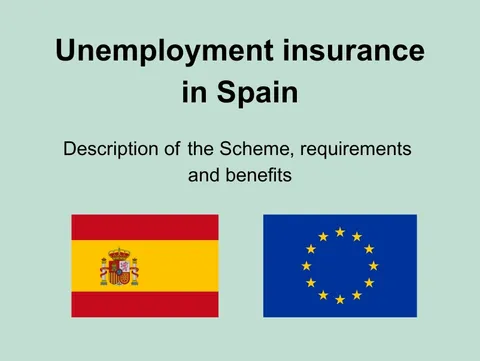EU
Spain
Unemployment
Insurance
Unemployment Insurance in EU->Spain
Unemployment insurance in Spain
NOTE: Be aware that the Parliament in Spain have have decided to change the Unemployment Insurance Scheme. The new regulation simplifies procedures to ensure greater flexibility in access and reduce administrative burdens, making it easier for citizens to process and receive unemployment benefits. There will also be changes in benefit amounts.
The new rules will be effective from November 1, 2024.
The following article is based on the regulations that will apply until November 1, 2024. If you want to apply after new rules, please see this article from SEPE.
This article explains how to apply for financial support if you are unemployed and have paid social security contributions.
If you have not paid enough social security contributions or if you meet some special requirements, you can instead apply for Non-contributory unemployment allowance (subsidio por desempleo de nivel asistencial) or Active integration income (renta activa de inserción).
You can find information about these Non-contributory allowances in this article from SEPE.
The rest of this page is therefore about Contributory unemployment benefit (prestación contributiva de desempleo).
When can you apply for these?
If you are unemployed but are able and willing to work, if you have been dismissed or if, due to cut-backs at your company, your working hours and salary have suffered a reduction of between 10% and 70%, you are entitled to apply for financial support.
If you are registered in one of the Spanish social security systems and have been paying your contributions, you are entitled to Contributory unemployment benefit: a contributory benefit awarded to people who are unemployed but committed to working and who have contributed for a minimum of 360 days during the previous 6 years before becoming unemployed.
What requirements must you meet?
You will be entitled to this benefit if:
- you are registered with Social Security
- are legally unemployed, register as a job seeker in the public employment service, are actively seeking employment and are willing to accept suitable employment
- have paid contributions for at least 360 days in the 6 years before becoming unemployed or before the end of your obligation to pay contributions
- are older than 16 and have not yet reached retirement age.
What are you entitled to and how can you apply for it?
If you are completely unemployed, the unemployment benefit entitles you to:
| First 180 days | From day 181 |
| 70% of the calculation basis | 50% of the calculation basis |
The amount of the benefit may in no case whatsoever be higher or lower than the set limits, depending on the number of family members who are dependent on the unemployed person.
| Without children | With children | |
| Minimum amounts | 80% of the IPREM, increased by a sixth (€560 a month) | 107% of the IPREM, increased by a sixth (€749 a month) |
Read more at the IPREM Website.
| Without children | With one child | With two children | |
| Maximum amounts | 175% of the IPREM, increased by a sixth (€1,225 a month) | 200% of the IPREM, increased by a sixth (€1,400 a month) | 225% of the IPREM, increased by a sixth (€1,575 a month) |
Read more at the IPREM Website.
In the event of unemployment due to losing a part-time job, benefits are calculated in proportion to the reduction in working hours. Minimum and maximum limits are reduced proportionally, after applying the same percentage that results from hours worked divided by the usual company hours.
The duration of benefits, which varies between 120 and 720 days, depends on the length of time for which the person paid their social security contributions during the previous 6 years.
These benefits are managed by the Servicio Público de Empleo Estatal, SEPE (State Public Employment Service). The first step to obtaining the benefit is to register as a job seeker in one of their offices and, once there, apply for the benefit within two weeks after you become legally unemployed. You can also apply online, through the sede electrónica del SEPE.
Jargon busters
- Contributory: contributory benefits are ones which require a minimum level of contributions, that is, it is necessary to have paid social security contributions for a set length of time.
- Commitment to work: refers to the duty of the unemployed person to actively look for employment, accept a suitable placement and take part in training, retraining or professional integration activities.
- Suitable placement: a job or placement is suitable when it coincides with the profession requested by the worker, his/her normal profession or with any other profession suited to his/her physical and educational aptitudes. In any event, the placement that coincides with the last job is usually suitable, if it lasted for at least three months.
- Calculation basis: is the average of the contribution bases for unemployment during the last 180 days worked, excluding payment for overtime.
Documents you will need
You can apply for your benefit at the Servicio Público de Empleo Estatal (SEPE). Here you should submit the required documents along with the "Application for contributory unemployment benefit". Seafarers can use these forms:
Find out about your entitlements
These links will help you to find out about your entitlements in Spain.
- Find details about Unemployment benefit.
- FAQ Unemployment benefits.
- You can find out more about the General Social Security Act in Spain in the Royal Legislative Decree 8/2015 of 30 October.
- New measures introduced by Royal Decree-Law 4/2013 on the issue of benefits.
Who can you contact?
State Public Employment Service
SEPE central services
C/ Condesa de Venadito, 9
28027 Madrid
SPAIN
Tel. +34 917006600
Fax +34 917006716
Telephone number for workers: +34 901119999
This page was last updated in 2024.
- Unemployment insurance in Europe →
Unemployment Insurance in Spain
You might also be interested in:
⇒EU social security coordination
⇒Unemployment Insurance in the Nordic countries
Key points of EU Unemployment Insurance coordination
- Transferring periods of work and insurance between EEA countries As an EU citizen you can transfer acquired rights from Unemployment Insurance when moving between EU/EEA contries. In this way it may be easier to become entitled to unemployment benefit in the country you move to.
In the vast majority of the Member states the aggregation rule become fully applicable as soon as you starts to work in the country. However in Denmark, Belgium and Finland you must work some period there before you can use the aggregation rule.
You need a PD U1 document in the country you leave or if the involved countries use electronically exhange (EESSI) there will be issued a SED U002. The countries who issues the highest number of PD U1 documents are Germany, Austria, Switzerland and the Netherlands. The countries who receives most PD U1 documents are Lithuania and Italy. - Transferring unemployment benefits Under certain conditions you can go to another EU country to look for work and continue to receive your unemployment benefits from the country where you became unemployed. The period you can export your unemployment benefits varies from 3 to 6 months in the different Member states.
You have to apply for a PD U2 document in the country you leave, or if you haven't done that the institution in the receiving country must request a SED U008 from the competent institution in your last country.
The countries who issues the highest number of PD U2 documents are Germany, Switzerland, the Netherlands and Denmark. Poland is the country who receives by far most PD U2 documents. - Unemployment benefits coverage According to OECD the net replacement of income after 2 months of unemployment, for a single person without children whose previous in-work earnings were 67% of the average wage varies from 33 percent (Ireland) to 91 percent (Belgium). Read more here..
- Having residence in another EU country than where you work? According to EU social security coordination rules you must only be insured against unemployment in one country at a time. As a generel rule this country is where you work.
In Member states who have compulsory insurance, you will automatically be covered when you start working there.
However you may be insured by your country of residence if you are posted to a EU/EEA country or work in two or more EU/EEA countries at a time. In these situations you can not your self decide where to have unemployment Insurance, but you (or your employer) must apply for a PD A1 document which states in which country you are covered by social security, including Unemployment Insurance. Special rule also apply for cross-border workers ("frontier workers"). - Third-country Nationals working in EU/EEANON-EEA citizens are covered by Unemployment Insurance in the EU countries who have compulsory Unemployment Insurance. In countries with voluntary Unemployment Insurance (Denmark, Sweden and Finland) third-country nationals can become member of an Unemployment Insurance Fund.
In the most countries Third-country nationals can also use the EU Coordination rules when moving within EU/EEA (however not in Denmark, Iceland, Liechtenstein, Norway and Switzerland).
Third-country nationals in short-tem working relations often faces problems with actually get Unemployment benefits, even though they have contributed to the system. This is due to the fact that one normally need a residence permit which allow one to take any job, and also because of a qualifying period in most countries between 6-12 months.

